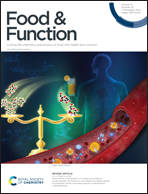Protective effect of β-carotene on OVA-induced food allergy in mice by strengthening intestinal epithelial barrier function and regulating intestinal microflora
Abstract
β-Carotene is a dietary source of vitamin A, and its physiological functions, such as anti-inflammatory activity, immune regulation, and improvement of intestinal flora, are attracting increasing attention. Recent studies have shown that the development of food allergy is closely related to intestinal dysfunction. Therefore, the present study investigated the potential anti-food allergy activity of β-carotene and its regulatory intestinal homeostasis pathway. The results obtained using an ovalbumin (OVA)-induced food allergy mouse model indicated that the clinical allergic symptoms were alleviated, and the levels of anaphylactic mediators (such as immunoglobulin (Ig) E, IgG, and histamine) were reduced after β-carotene supplementation at 5.00 mg per kg per day. In addition, the expression of tight junction (TJ) proteins (claudin-1, occludin, and ZO-1) increased by 38.58%, 24.39%, and 26.23%, respectively. Additionally, the secretion of secretory IgA (sIgA) and the regeneration of islet-derived protein (Reg) IIIγ were promoted in the intestinal mucous after β-carotene administration. Furthermore, the alpha and beta diversity analysis showed that the composition and diversity of the intestinal flora in the β-carotene group tended to be normalized compared to the model group. Higher levels of beneficial bacteria, such as Clostridiaceae, were evident in the intestinal microflora of the sensitized mice after β-carotene administration, while pathogenic bacteria, such as Streptococcaceae, were reduced. Consequently, β-carotene may protect against food allergy by strengthening intestinal epithelial barrier function and regulating intestinal microflora.



 Please wait while we load your content...
Please wait while we load your content...